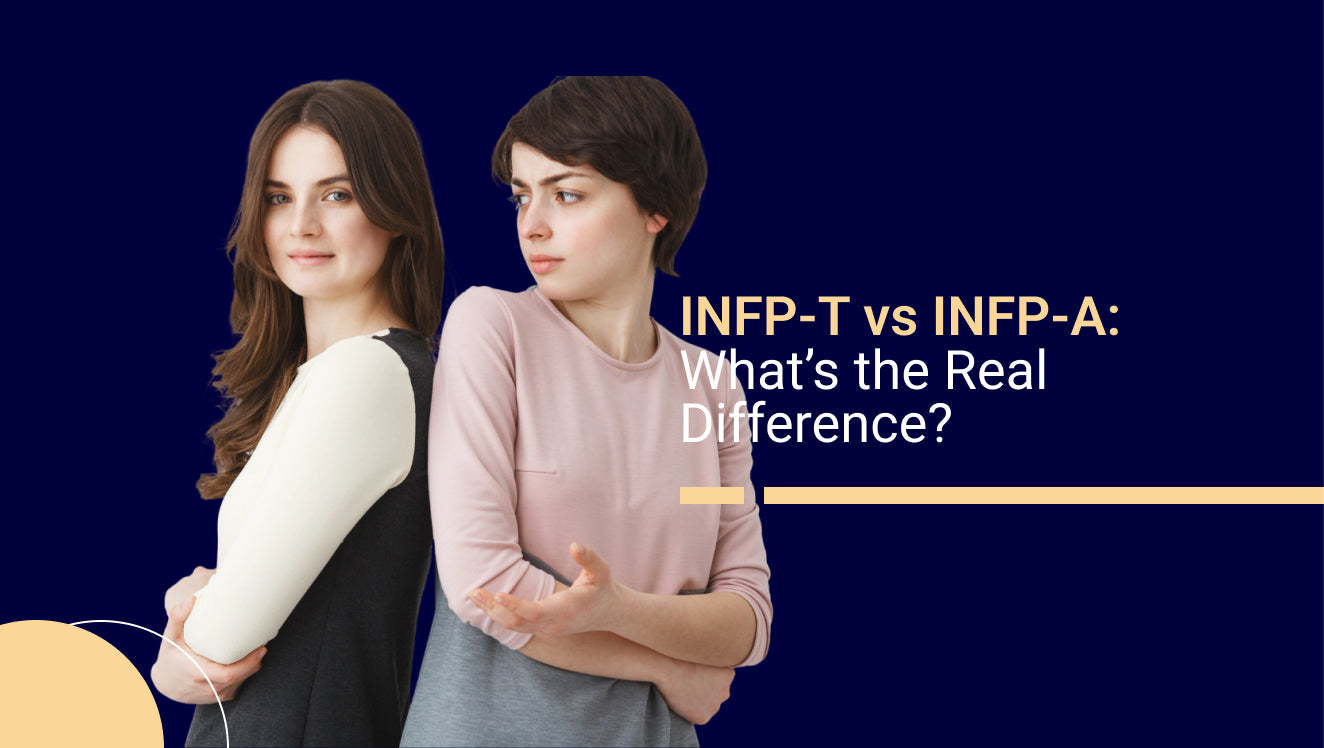You know you're an INFP creative, empathetic, and deeply introspective. But if you’ve come across labels like INFP-T and INFP-A, you’re probably wondering: What do these letters mean, and how do they affect my personality?
These are identity modifiers: Turbulent (T) and Assertive (A). While they don’t change your INFP core, they do influence how you respond to stress, self-doubt, decision-making, and confidence.
In this guide, we’ll explore how INFP-Ts and INFP-As experience the world differently emotionally, socially, and personally so you can better understand yourself or the Mediator in your life.
Quick Snapshot: INFP-A vs INFP-T
|
Trait |
INFP-A (Assertive) |
INFP-T (Turbulent) |
|
Self-Confidence |
Generally secure, confident |
Often self-doubting, sensitive |
|
Reaction to Stress |
Calmer under pressure |
Easily overwhelmed by stress |
|
Decision-Making |
Trusts gut, less second-guessing |
Prone to indecision and regret |
|
Social Perception |
More relaxed in social settings |
Worries about others’ opinions |
|
Emotional Sensitivity |
Lower sensitivity to criticism |
Highly sensitive, internalises judgment |
|
Personal Growth |
Steady and internal |
Motivated by perceived flaws |
According to 16Personalities data, 85% of Assertive Mediators say they feel comfortable with themselves, compared to just 40% of Turbulent Mediators.
1. Self-Worth and Confidence
INFP-As tend to have a strong sense of inner worth. They may be aware of their flaws, but they don’t let them define their identity. Their self-esteem is less likely to rise and fall based on outside validation.
On the other hand, INFP-Ts often experience an emotional tug-of-war. They can be deeply self-critical, often questioning their worth after perceived failures or misunderstandings.
For example: After a failed job interview, an INFP-A might say, “It wasn’t a good fit,” while an INFP-T might spiral into thoughts of inadequacy.
2. Emotional Reactivity and Depth
INFP-Ts feel everything more intensely joy, sadness, disappointment, inspiration. Their emotional depth allows them to connect deeply with others, but it can also leave them feeling vulnerable.
INFP-As are still sensitive, but their emotional reactions are more balanced. They’re less likely to be thrown off course by criticism or conflict.
According to psychologist Dr. Elaine Aron, highly sensitive people (like INFPs) tend to process emotional input more deeply, which explains the intensity many INFP-Ts report.
3. Stress and Overwhelm
When challenges arise, INFP-As are more likely to take them in stride. They may still feel the pressure, but they can typically maintain perspective.
INFP-Ts, however, can get easily overwhelmed. Their imagination which is normally a gift can amplify worst-case scenarios and lead to paralysis or procrastination.
This may tie into the brain’s default mode network (DMN), which is more active in introspective and imaginative people. Overactivation of the DMN is linked with rumination a pattern common in INFP-Ts.
4. Relationships and Attachment
INFP-Ts often crave deep emotional bonds, but they may also fear abandonment or emotional distance. They’re sensitive to subtleties in their partner’s tone or mood and may seek reassurance frequently.
INFP-As are equally loyal and romantic, but they tend to trust more easily and feel secure even when alone. Their sense of self is less dependent on external affirmation.
Example: A delayed text reply might trigger anxiety in an INFP-T, while an INFP-A may shrug it off without worry.
According to Attachment Theory, INFP-Ts may exhibit more anxious-preoccupied behaviours, while INFP-As lean toward secure attachment styles.
5. Growth, Motivation, and Perfectionism
INFP-Ts are often motivated by perceived flaws. Their drive to “fix” or improve themselves stems from an inner sense of not being enough.
This can lead to powerful transformations but it can also fuel burnout and perfectionism.
INFP-As pursue growth too, but it comes from a more grounded place. They aim for self-actualisation, not to erase a sense of unworthiness.
In a survey by 16Personalities, 68% of INFP-Ts said they often regret how they handled situations only 24% of INFP-As said the same.
6. Coping with Mistakes and Regret
Turbulent INFPs may dwell on past mistakes for weeks, months even years. They often replay conversations in their heads, wondering what they should’ve said or done.
Assertive INFPs are better at letting go. They accept what happened, learn from it, and move forward with grace.
Psychologist Kristin Neff emphasises the role of self-compassion in resilience. INFP-As often display this naturally; INFP-Ts may need to cultivate it intentionally.
Want to Strengthen Your Emotional Balance as an INFP?
Whether you’re INFP-T or INFP-A, your emotional depth is a gift but it can also be overwhelming. That’s where neuroVIZR comes in.
neuroVIZR brain training app is a light-and-sound brainwave technology designed to calm the nervous system and enhance emotional clarity. It helps INFPs process their thoughts without spiraling into anxiety or self-doubt.
Imagine feeling grounded even in the middle of emotional storms. That’s the INFP superpower neuroVIZR helps unlock.
So… Which INFP Identity Is Better?
Neither. INFP-Ts may feel more deeply and reflect longer. INFP-As may stay steadier in chaos. Both offer different strengths.
The real power comes from knowing yourself. When you understand how you work, you can build better habits, choose the right relationships, and honour your needs.
Rather than changing who you are build on what makes you powerful.
Final Thought
Being an INFP means you care deeply, sincerely, and often quietly. Whether you’re Turbulent or Assertive, your journey is uniquely yours.
Use it to write, heal, dream, and grow. And if tools like neuroVIZR can help you feel more grounded in that process? Even better.
Your inner world is your compass. Honour it, trust it, and let it guide you to your most authentic self.
Disclaimer: neuroVIZR is a wellness device designed to support relaxation, focus, and overall brain wellness. It is not a medical device and does not diagnose, treat, cure, or prevent any medical condition. Results may vary from person to person.




























Share:
Can Dehydration Cause Brain Fog? Signs & Fixes Explained
What Do You Do on Your Hard Days Running? Here’s How to Keep Going When Everything Feels Heavy